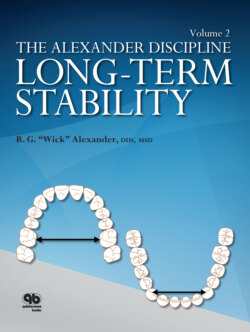Читать книгу The 20 Principles of the Alexander Discipline, Volume 2 - R.G. "Wick" Alexander - Страница 14
На сайте Литреса книга снята с продажи.
Case 1-1
ОглавлениеOverview
A mature adult previously treated (at least four premolars extracted) presented with a severe overbite (8 mm). Lingual brackets were discussed, but labial Alexander brackets were decided upon.
Examination and diagnosis
A 39-year-old woman presented with a Class I skeletal pattern. All four first premolars, the maxillary left second molar, and four third molars were missing. Even though premolars had been previously extracted, mandibular crowding of 5 mm was present. The patient’s occlusion demonstrated a Class I molar relationship with overjet of 4 mm and overbite of 8 mm. The mandibular midline was shifted 2 mm to the right, and the left first molars were in reverse articulation. Cephalometrically, the patient presented with a low-angle Class I skeletal pattern with a Division 2 torque on the anterior teeth.
Treatment plan
Do not remove additional teeth. This patient seeking treatment before the days of implants, the missing second molar allowed open space for a maxillary left second premolar partial denture. Band and bond the maxillary arch first, create a normal arch form, and then place a maxillary bite plate before bonding the mandibular arch. The reverse articulation found with the mandibular left first molars was corrected by expanding and constricting archwires. Finish with multiple elastics.
Evaluation
This case was treated in 1983, before superelastic archwires came into being. Yet both arches were treated with only three archwires, all stainless steel (SS). A mistake made in the case was not adequately opening the space in the maxillary left second premolar. However, records taken 20 years posttreatment showed no negative side effects with the cantilever partial denture.
Although I always give the patient the option to wear or remove, the patient continues to wear her bonded 3 × 3. Why? In this case, the incisor mandibular plane angle (IMPA) was considerably advanced, and the patient’s maturity at the beginning of treatment made me comfortable leaving the 3 × 3 in place.
Excellent oral hygiene throughout the years resulted in healthy periodontal hard and soft tissues.
Discussion
In deep bite malocclusions, always begin treatment in the maxillary arch to improve torque on anterior teeth. This will also create a normal maxillary arch form, so the bite plate will fit better. In this case, a bite plate was placed when the mandibular arch was bonded/banded 7 months later. Very little adjustment was needed on the bite plate, so it was comfortable for the patient to wear. Comparing intraoral lateral views of 12 and 18 months shows the leveling of the mandibular arch using reverse curve of Spee.
Case 1-1
Figs 1-2a to 1-2c Pretreatment facial views of a 39-year-old woman. (a) Soft tissue profile shows balance. (b) Frontal view shows balance. (c) Smile shows slight asymmetry.
Figs 1-2d to 1-2f Pretreatment intraoral views. (d) Class I molar relationship. (e) Overbite of 8 mm and overjet of 4 mm. (f) Mandibular left first molar in reverse articulation relationship.
Figs 1-2g and 1-2h Pretreatment occlusal views. Initial maxillary intermolar width: 31.1 mm; initial mandibular intercanine width: 24.4 mm. (g) Maxillary arch is crowded and narrow. (h) Mandibular discrepancy is 5 mm.
Fig 1-2i Pretreatment cephalometric tracing showing skeletal Class I low-angle pattern and upright maxillary and mandibular incisors.
Fig 1-2j Pretreatment panoramic radiograph shows missing four first premolars, maxillary left second molar, and four third molars.
Figs 1-2k and 1-2l Intraoral views 12 months into treatment. Note the curve of Spee in the mandibular arch. A maxillary coil spring is used to create and hold space for a partial denture.
Figs 1-2m and 1-2n Intraoral views 18 months into treatment. The mandibular arch is leveled, and there is less space on the left side for the maxillary second premolar partial denture than expected.
Figs 1-2o and 1-2p Intraoral views 22 months into treatment. The mandibular archwire is sectioned, and finishing elastics consisting of a W with a tail are used.
Figs 1-2q to 1-2s Final facial views, age 41 years. (q) Soft tissue profile shows nice balance. (r) Frontal view shows nice balance. (s) Smile has a nice line and arc. There are no dark buccal corridors.
Figs 1-2t to 1-2v Final occlusion. (t) Class I molar relationship. (u) Midline is coincident. (v) Partial denture in place for the maxillary left second premolar.
Figs 1-2w and 1-2x Final occlusal views. Final maxillary intermolar width: 32.1 mm; final mandibular intercanine width: 28.0 mm.
Fig 1-2y Final cephalometric tracing.
Fig 1-2z Final panoramic radiograph showing root positions and partial denture placement on the left side.
Figs 1-2aa to 1-2cc Facial views 20 years posttreatment.
Figs 1-2dd to 1-2ff Intraoral views 20 years posttreatment.
Figs 1-2gg and 1-2hh Occlusal views 20 years posttreatment. The patient being an adult at the beginning of treatment, the bonded 3 × 3 has remained in position.
Table 1-1 Archwire sequence
| Archwire | Duration (months) | |
|---|---|---|
| Maxillary | ||
| 0.0175 multistrand SS | 1 | |
| 0.016 SS | 8 | |
| 17 × 25 SS | 14 | |
| Active treatment time: | 23 months | |
| Mandibular | ||
| None | 6 | |
| 0.0175 multistrand SS | 3 | |
| 17 × 25 multistrand SS | 2 | |
| 17 × 25 SS | 12 | |
| Active treatment time: | 17 months |
Table 1-2 Individualized forces
| Force | Duration (months) | |
|---|---|---|
| Coil (maxillary left | 21 | |
| second premolar) | ||
| Bite plate | 12 | |
| Elastics | ||
| Triangular | 3 | |
| Class II | 5 | |
| Buccal box | 1 | |
| Finishing | 1 |
